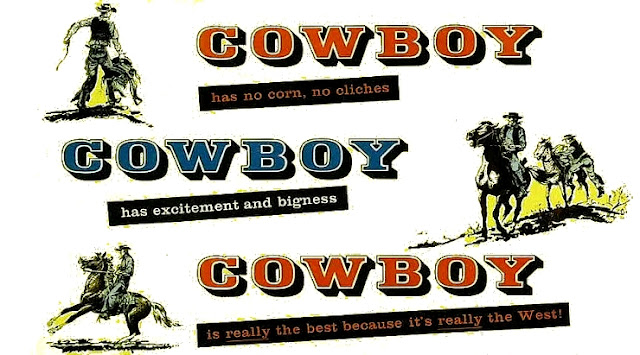.
I say it was based loosely on Frank Harris’s reminiscences but then Frank Harris’s book was only based loosely on his reminiscences to start with. Daves said that he estimated that at least 50% of what Harris ‘experienced’ was lies. So he has carte blanche to monkey about with the story.
.
Anna Kashfi (Mrs Marlon Brando) as the señorita doesn’t really come across as a real person, more of a Mexican doll, but maybe that was Harris at work. Nice to see Vaughan Taylor as the Chicago hotel manager though. He’s usually a pusillanimous townsman in Westerns but he’s kinda got promoted here.
Richard Jaeckel (Charlie Prince the year before) has a short part as a trailhand who causes Strother Martin to be fatally bitten by a rattler during horseplay but Strother doesn’t even get credited, which seems a bit harsh when you’ve been bitten to death by a snake. His character isn’t named in the picture, either, and this underlines the callousness of the cowboys (they are an unpleasant bunch really). Trail boss Ford’s eulogy is less than glowing – in fact it’s heartless. “In the long run I don’t think it would have made any difference,” he says. Similarly, in Mexico, when Harris is trying to whip up support for a rescue mission of cowboy Charlie (he has got into deep water in a cantina by wooing a Mexican maid) the drovers can’t really be bothered to go save Charlie. As well as selfish and callous, at other moments they are shown as boorish, racist and sexist. This was perhaps Daves’s quest for the ‘realist’ Western.
.
I would say that Daves did not have an overtly recognizable style in the way that John Ford or Sam Peckinpah did, or Anthony Mann. After the first three recognizably coherent ‘Indian’ Westerns (Broken Arrow, Drum Beat and White Feather) each movie is different, perhaps because he was always experimenting and trying out new ideas. You might not know, unless you had been told, that this movie was directed by the same guy as 3:10, although Daves certainly does have themes and ideas common to all his flicks.
What makes Cowboy a little different is the perspective given by seeing the West through the eyes of a ‘civilized’ Easterner (New Englander Lemmon was good casting), who is at first appalled (“I thought I was gonna ride with some men. You’re just a bunch of animals”) but then out-Fords Ford.
It’s interesting that although Daves was very good at the low-key erotic (you couldn’t really be anything other than low-key in those days) and several of his films have glamorous love-interest in them, most are essentially stories of male bonding. Jeffords and Cochise in Broken Arrow, Johnny McKay and Captain Jack in Drum Beat, Josh Tanner and Broken Hand in White Feather, and so on. This one too. The two men even end up bathing together. Don’t get me wrong, I’m not saying they are gay films. Any homoeroticism there might be is ultra-sublimated and all the men concerned show interest in the lovely leading ladies they are assigned (eccapt maybe Alan Ladd in Drum Beat who runs a mile when he is proposed to).
.
.



